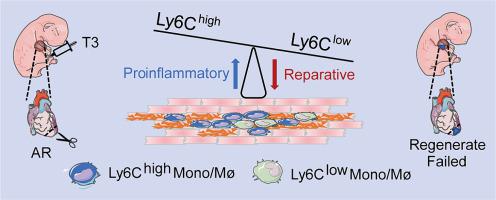当前位置:
X-MOL 学术
›
J. Mol. Cell. Cardiol.
›
论文详情
Our official English website, www.x-mol.net, welcomes your feedback! (Note: you will need to create a separate account there.)
Triiodothyronine induces a proinflammatory monocyte/macrophage profile and impedes cardiac regeneration
Journal of Molecular and Cellular Cardiology ( IF 5 ) Pub Date : 2024-04-10 , DOI: 10.1016/j.yjmcc.2024.04.007 Ziwei Chen , Dongcheng Cai , Yifan Xie , Jiajun Zhong , Mengge Wu , Huijun Yang , Jie Feng , Hong Lian , Kefei Dou , Yu Nie
Journal of Molecular and Cellular Cardiology ( IF 5 ) Pub Date : 2024-04-10 , DOI: 10.1016/j.yjmcc.2024.04.007 Ziwei Chen , Dongcheng Cai , Yifan Xie , Jiajun Zhong , Mengge Wu , Huijun Yang , Jie Feng , Hong Lian , Kefei Dou , Yu Nie

|
Neonatal mouse hearts can regenerate post-injury, unlike adult hearts that form fibrotic scars. The mechanism of thyroid hormone signaling in cardiac regeneration warrants further study. We found that triiodothyronine impairs cardiomyocyte proliferation and heart regeneration in neonatal mice after apical resection. Single-cell RNA-Sequencing on cardiac CD45-positive leukocytes revealed a pro-inflammatory phenotype in monocytes/macrophages after triiodothyronine treatment. Furthermore, we observed that cardiomyocyte proliferation was inhibited by medium from triiodothyronine-treated macrophages, while triiodothyronine itself had no direct effect on the cardiomyocytes . Our study unveils a novel role of triiodothyronine in mediating the inflammatory response that hinders heart regeneration.
中文翻译:

三碘甲状腺原氨酸诱导促炎单核细胞/巨噬细胞特征并阻碍心脏再生
新生小鼠心脏在受伤后可以再生,这与形成纤维化疤痕的成年心脏不同。甲状腺激素信号在心脏再生中的机制值得进一步研究。我们发现三碘甲状腺原氨酸会损害根尖切除术后新生小鼠的心肌细胞增殖和心脏再生。心脏 CD45 阳性白细胞的单细胞 RNA 测序揭示了三碘甲状腺原氨酸治疗后单核细胞/巨噬细胞中的促炎表型。此外,我们观察到三碘甲状腺原氨酸处理的巨噬细胞的培养基抑制心肌细胞增殖,而三碘甲状腺原氨酸本身对心肌细胞没有直接影响。我们的研究揭示了三碘甲状腺原氨酸在介导阻碍心脏再生的炎症反应中的新作用。
更新日期:2024-04-10
中文翻译:

三碘甲状腺原氨酸诱导促炎单核细胞/巨噬细胞特征并阻碍心脏再生
新生小鼠心脏在受伤后可以再生,这与形成纤维化疤痕的成年心脏不同。甲状腺激素信号在心脏再生中的机制值得进一步研究。我们发现三碘甲状腺原氨酸会损害根尖切除术后新生小鼠的心肌细胞增殖和心脏再生。心脏 CD45 阳性白细胞的单细胞 RNA 测序揭示了三碘甲状腺原氨酸治疗后单核细胞/巨噬细胞中的促炎表型。此外,我们观察到三碘甲状腺原氨酸处理的巨噬细胞的培养基抑制心肌细胞增殖,而三碘甲状腺原氨酸本身对心肌细胞没有直接影响。我们的研究揭示了三碘甲状腺原氨酸在介导阻碍心脏再生的炎症反应中的新作用。



























 京公网安备 11010802027423号
京公网安备 11010802027423号